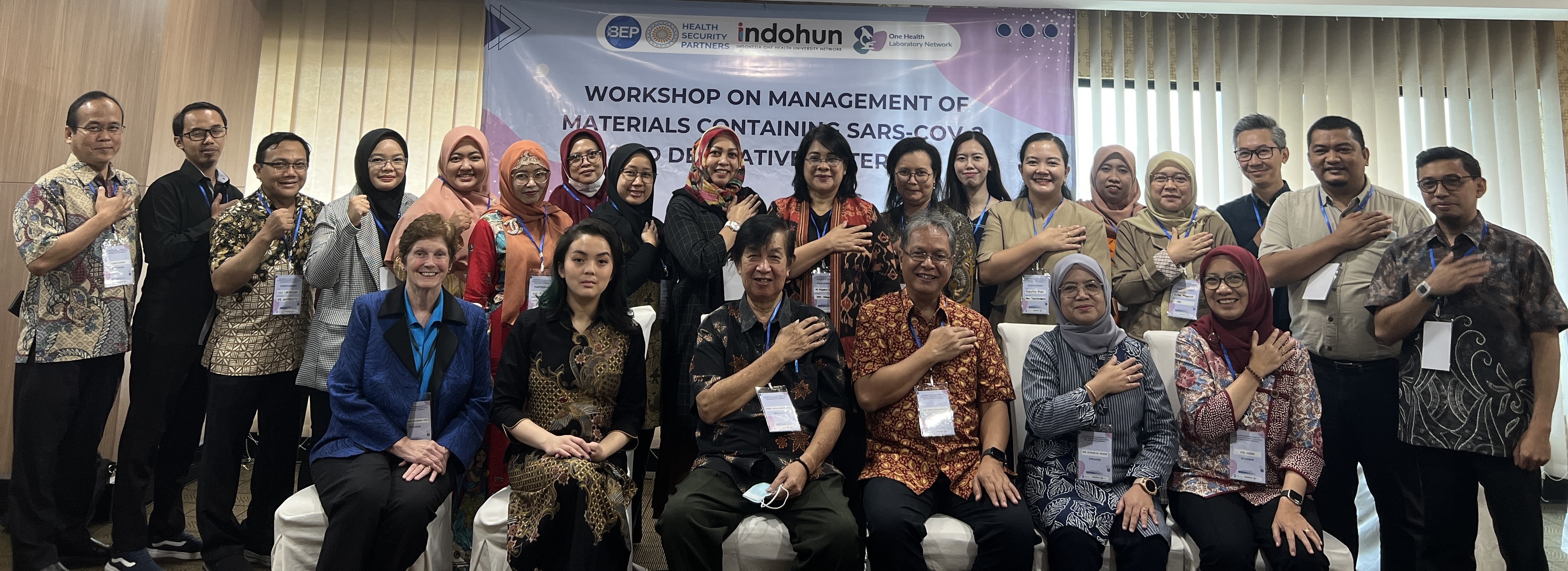In order to maintain public safety and health, attention to the management of materials containing SARS-CoV-2 and its derivative materials is becoming increasingly important. In response to the global pandemic that recently hit the world, understanding and practices related to the management of these materials have become a major focus for various sectors, including industry, research and health services.
Indonesia One Health University Network (INDOHUN) continues to strive to support the implementation of the Laboratory Biorisk Management System (SMBL) through the One Health Laboratory Network (OHLN) program in university laboratories in order to improve safety and security in handling biological materials during investigations or research related to identification and detection of emerging infectious diseases (PIE) and zoonoses.
INDOHUN-OHLN in collaboration with Health Security Partners (HSP) with support from the US Biosecurity Engagement Program (BEP), the Department of State is working to develop a COVID-19 sample inventory protocol intended for laboratories that examine, store and destroy COVID-19 samples . Therefore, INDOHUN will carry out a “Workshop on Management of Materials Containing SARS-CoV-2 and Its Derivative Materials”
Realizing this urgency, INDOHUN through the One Health Laboratory Network (OHLN) program together with Health Security Partners (HSP) has carried out activities to increase the capacity of laboratory personnel through the “Workshop on Management of Materials Containing SARS-CoV-2 and Derivative Materials”
This workshop activity was held with the aim of:
- Increase participants’ understanding of the importance of a safe and secure culture in working with hazardous biological materials.
- Encourage laboratory team collaboration in implementation, address security as a priority, and ensure compliance with established security procedures.
- Providing an in-depth understanding of the management of materials containing SARS-CoV-2 and its derivative materials,
- To equip participants with the knowledge, skills and best practices in managing these materials.
This activity was carried out for two days on Thursday and Friday, 16-17 November 2023, at the Manhattan Hotel Jakarta (28th Street Meeting Room, 10th Floor), Jakarta.
In this activity INDOHUN invited universities, including:
- Faculty of Medicine and Life Sciences, Warmadewa University
- Faculty of Medicine and Health Sciences, Atma Jaya Catholic University Indonesia
- Faculty of Medicine, Nursing and Public Health, Gadjah Mada University
- Faculty of Medicine, UIN Syarif Hidayatullah Jakarta
- Faculty of Medicine, Hasanuddin University
- Faculty of Medicine, University of Jember
- Faculty of Medicine, Padjadjaran University
- Faculty of Medicine, Syiah Kuala University
- Faculty of Medicine, Tarumanagara University
- Institute of Tropical Diseases, Airlangga University
- Center for Virology and Cancer Pathobiology Research (PRVKP), University of Indonesia
- Center for Primate Animal Studies, IPB University
- Udayana University Hospital, Udayana University Faculty of Medicine
This activity was opened online by Dariel A. Hopersberger, PhD as Program Advisor – US BEP Washington , then continued with remarks from Mrs. Wahyuni Kamah as Biosecurity Engagement Program (BEP) Manager, US Embassy – Jakarta, then direct remarks by Jamie Li as Program Manager, Health Security Partners (HSP) , and final remarks as well as opening the activity by Prof. Dr. Agus Suwandono, MPH, Dr.PH as coordinator of the Indonesian One Health University Network (INDOHUN).
For 2 days, participants received material relevant to the management of materials containing SARS-CoV-2 and derivative materials. The materials obtained during the 2 days following the activity include:
Day -1 :
- Preventing Pathogen Abuse: The Need for a Biosecurity Program – Dr.drh. Diah Iskandriati, IFBA PC – Indonesian Biorisk Association
- Inventory Process, Records, Inventory Verification Identifying Valuable Materials – Barbara Johnson, PhD, RBP Biosafety Biosecurity International , USA
- Inactivation Process, Validation and Documentation, Material Transfer and Recording, and Material Management if SARS-CoV-2 Testing is Reactivated – Barbara Johnson, PhD, RBP Biosafety Biosecurity International , USA
- Material Transfer Agreement (MTA) and microorganism storage regulations – Dr Atit Kanti, Indonesian Research and Innovation Agency
- Ministry of Health regulations regarding storage of SARS-CoV-2 and other pathogens – Dr Ni Ketut Susilarini, BKPK, Ministry of Health
- The Role of Institutional Oversight for inventory management – Dr. drh. Diah Iskandriati, IFBA PC – Indonesian Biorisk Association
- Process at Research Institutes – Learning from Indonesian Cultural Collections – Dr.drh. Susan M. Noor, MVSC IFBA PC, Indonesian Research and Innovation Agency
- Inventory and documentation processes at universities – Learning from the University of Indonesia – Aroem Naroeni, DEA, Ph.D, Institute of Human Virology and Cancer Biology, University of Indonesia
Day 2 :
- Scenario: Use of an Assessment (Audit) Checklist – Barbara Johnson, PhD, RBP Biosafety Biosecurity International , USA
- Scenario: Applying this Process to Materials Containing Other Pathogens-GAP IV Approach – Barbara Johnson, PhD, RBP Biosafety Biosecurity International , USA
- Use of Inventory Documentation Form – Dr.drh. Susan M. Noor, MVSC IFBA PC, Indonesian Research and Innovation Agency
- Documenting Samples of Materials and Equipment for Inactivating SARS-CoV-2 by Autoclaving, Chemicals, and Other Means – Aroem Naroeni, DEA, Ph.D, Institute of Human Virology and Cancer Biology, University of Indonesia
In this workshop, participants were invited to understand the management of materials containing SARS-CoV-2, the risks associated with the management of materials containing SARS-CoV-2, as well as effective risk management strategies. In addition, aspects of laboratory safety, related regulations, and the ethics of using these materials in various research and industrial contexts are also discussed. Through presentation, question and answer and discussion sessions, it is hoped that participants can increase their understanding of safe and sustainable materials management protocols. Thus, it is also hoped that the knowledge gained in this workshop can be applied directly in their respective work environments.
The group discussion activity this time was quite different, namely that each group discussed and provided suggestions and input on the inventory protocol and self-assessment checklist that had been previously developed by the INDOHUN expert team. This discussion aims to further refine the self-assessment protocols and checklists so that they can be accepted according to needs in each university facility.
The two-day intensive workshop provided an opportunity to share experiences between participants and build a strong collaborative network among professionals who have similar interests and responsibilities in the management of materials involving SARS-CoV-2. We hope that this workshop will not only be a place for learning, but also a forum for exchanging ideas and experiences to support joint efforts in understanding the management of materials containing SARS-CoV-2. Hopefully this activity can make a positive contribution in improving the management of materials containing SARS-CoV-2.
As a concrete step in implementing the Inventor i protocol , Mrs. Dr. Diah Iskandriati announced a follow-up program that would be implemented after this activity . This program provide the opportunity for workshop participants to carry out self-assessments based on the inventory protocol guide developed by the INDOHUN expert team as well receive consultation and assistance regarding the management of materials containing SARS-CoV-2. As a closing, the event continued with the distribution of certificates to the presenters and participants who have contributed to the success of this workshop. Next, the activity was closed by Mr Agus Heri Setiawan, S.KM, MPH as Program Manager INDOHUN -OHLN.
The success of this activity is not only measured by the new knowledge we have gained, but also by the collaborative network we have built and our shared enthusiasm to improve the management of materials involving SARS-CoV-2 and its derivative materials. Hopefully each participant can apply their new insights in their respective work environments, encourage innovation, and contribute to joint efforts in maintaining public safety and health.




Leave a Reply